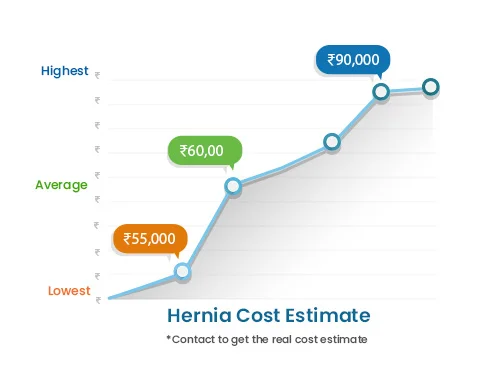Hernia Surgery in Delhi NCR
Laparoscopic hernia surgery in Delhi NCR is highly affordable with Glamyo Health. Get free consultation with best hernia surgeons and hernia hospitals in Delhi NCR.
Glamyo Health’s advanced laparoscopic and robotic repair surgery cures hernia with minimal invasion using the best quality mesh and tacker. Thus, ensuring a hassle-free experience at affordable prices with personalized care.

1 Lakh+
Happy Patients
350+
Doctors
200+
Hospitals
40+
Cities
40,000+
Surgeries
WHY BOOK HERNIA SURGERY WITH GLAMYO HEALTH?
 Best Surgeons
Best Surgeons
 1 Day Discharge
1 Day Discharge
 Free Follow Ups
Free Follow Ups
 Free Pick Up & Drop Service
Free Pick Up & Drop Service
 All Insurances Covered
All Insurances Covered
 Advanced Procedure
Advanced Procedure
HERNIA SURGERY IN Delhi NCR
Hernia is a medical disorder in which muscle tissues in an organ near the belly weaken, allowing the intestine or tissues to protrude through weak places nearby. A hernia is most commonly found in the abdomen between the chest and hips, although it can also occur in the upper thigh and groin.
The occurrence of a hernia can be caused by several factors. Some of them are related to weak muscles, lifting heavy weights, smoking, poor nutrition, chronic constipation, tobacco use, and so on. Although the majority of hernias aren't life-threatening, some cases may require surgery to avoid life-threatening complications if they don't go away on their own. Hernias can affect persons of any age group and any gender.
Hernia requires immediate treatment & surgeries in some cases, get in touch with Glamyo Health for the best hernia treatment in Delhi NCR, by the best hernia specialists in Delhi NCR in the best hernia clinic nearby.

HERNIA DOCTORS IN Delhi NCR
View AllHERNIA HOSPITALS & CLINICS IN Delhi NCR
View AllLAPAROSCOPIC HERNIA SURGERY COST IN Delhi NCR
View All
Type of surgery : Hernia
Hospitalization time : 1-2 Days
Cost range : 55,000 INR to 90,000 INR, Avg. 60,000 INR
For the Cost Estimate : CALL NOW
For the Cost Estimate : CALL NOW
HERNIA LASER TREATMENT REVIEWS IN Delhi NCR
View All
Puneet Kuma ...
Hernia
Good afternoon, my name is Pradeep Kumar, I am from Delhi and I am here for my younger brother (Puneet Kumar)'s hernia surgery. read more

 Hernia | Surgeries
Hernia | Surgeries Dr. Raj Kumar Singh4
Dr. Raj Kumar Singh4  Delhi Surgical Cente...4.3 (150)
Delhi Surgical Cente...4.3 (150) New Delhi
New Delhi

Shivanand M ...
Hernia
Hi, my father (Shivanand Mishra) had a Hernia and Hydrocele problem for which we contacted Glamyo Health and consultation with o read more

 Hernia | Surgeries
Hernia | Surgeries Glamyo Senior Surgeon
Glamyo Senior Surgeon  VC Clinic
VC Clinic  Others
Others

laxman khan ...
Hernia
Hi everyone, today I am here in Delhi surgical centre in Green park for my father-in-law's Hernia surgery in this centre. I got read more

 Hernia | Surgeries
Hernia | Surgeries Dr. Raj Kumar Singh4
Dr. Raj Kumar Singh4  Delhi Surgical Cente...4.3 (150)
Delhi Surgical Cente...4.3 (150) New Delhi
New Delhi

Nirpendra
Hernia
Hi, my brother (Nipendra) got hernia surgery done through Glamyo Health. Through Facebook ad he reached out to the medical coord read more

 Hernia | Surgeries
Hernia | Surgeries Dr. Shuddhatam jain4
Dr. Shuddhatam jain4  Apollo Noida4.3 (115)
Apollo Noida4.3 (115) New Delhi
New Delhi

kalicharan
Hernia
My father recently had hernia surgery and for this, we coordinated with Salman Khan. He referred us to a good hospital where the read more

 Hernia | Surgeries
Hernia | Surgeries Dr. Shuddhatam jain4
Dr. Shuddhatam jain4  Apollo Noida4.3 (115)
Apollo Noida4.3 (115) New Delhi
New Delhi

Jay Prakash
Hernia
My name is Jay Prakash and I am from Noida. I got to know about Glamyo Health through Facebook, and through my interaction with read more

 Hernia | Surgeries
Hernia | Surgeries Dr. Shuddhatam jain4
Dr. Shuddhatam jain4  Metro Noida
Metro Noida  New Delhi
New Delhi

Pramod Malh ...
Hernia
Hi Glamyo Health. I must say Ms. Naina from Glamyo Health has done a wonderful job. The hospital staff is very cooperative, hygi read more

 Hernia | Surgeries
Hernia | Surgeries Dr. Raj Kumar Singh4
Dr. Raj Kumar Singh4  Ayushman Hospital4.1 (68)
Ayushman Hospital4.1 (68) New Delhi
New Delhi

Rahamathula
Hernia
Hello, I had been troubled with a Hernia problem for so long and for this I reached out to Glamyo Health as my son told me about read more

 Hernia | Surgeries
Hernia | Surgeries Dr. V Devendran5
Dr. V Devendran5  Manipal Hospitals Ja...4.3 (95)
Manipal Hospitals Ja...4.3 (95) Bangalore
Bangalore

Mohammed Is ...
Hernia
Hi all, I am sharing a good experience with Glamyo Health. It was excellent services provided by Glamyo Health. It was paperless read more

 Hernia | Surgeries
Hernia | Surgeries Dr. Balakrishna S5
Dr. Balakrishna S5  Manipal Hospitals Ja...4.3 (95)
Manipal Hospitals Ja...4.3 (95) Bangalore
Bangalore

sujeet kuma ...
Hernia
Hi, my name is Sujeet Kumar and I was severely dealing with a Hernia problem. I was very confused if I should get the surgery or read more

 Hernia | Surgeries
Hernia | Surgeries Dr. Shuddhatam jain4
Dr. Shuddhatam jain4  Apollo Noida4.3 (115)
Apollo Noida4.3 (115) New Delhi
New Delhi
BENEFITS OF LAPAROSCOPIC SURGERY
- Pain
- Blood Loss
- Infection
- Recovery
- Follow Ups
LAPAROSCOPIC SURGERY
- Minimally Painful
- Low
- No
- Quick recovery
- Not Required
TRADITIONAL SURGERY
- Extremely Painful
- High
- Chances
- Bed rest required
- Required
WORRIED ABOUT PRICE?
Glamyo has made the latest, laparoscopic treatment for hernia affordable and accessible to all.
- Interest-free EMI facility
- Free follow-up consultation
- Free pickup & drop for surgery

KNOW MORE ABOUT HERNIA SURGERY IN Delhi NCR
A hernia is an extremely common and easily treatable medical condition affecting around 10 - 20% of the Indian population at some point in their life. With the right surgical care and treatment, one can get rid of a hernia very easily. In India, congenital muscular weakness and age-related deficits are the leading causes of hernia.
Hernias don’t go away on their own, hence requiring surgical treatments. You will gain a thorough understanding of everything concerning hernia from the best hernia treatment options to the best hernia surgery to opt for, alongside the best hernia doctors, in the best hospital for hernia by reading the contents on this page.
Surgery Options for Hernia in Delhi NCR
The only way to permanently fix a hernia is to undergo hernia repair surgery. If the hernia is not causing any pain or suffering, the doctor may recommend that the patient wait until the hernia is ready to be operated on. In most situations, doctors advise surgical repair of the hernia to avoid potentially life-threatening consequences.
Open Surgery: Open hernia repair surgery is the most common type of hernia repair surgery performed around the world. The surgeon makes a cut or incision in the groin to identify the hernia "sac" containing the protruding intestine in an open operation for hernia repair. The hernia is subsequently pushed back into the abdomen, and the abdominal wall is stitched shut. The surgeon may employ a synthetic mesh to tighten the closure through which the hernia protrudes if the opening is large.
Laparoscopic Surgery: This is a much more advanced procedure for treating inguinal hernias. Laparoscopic hernia repair surgery, often known as minimally invasive surgery, is a surgical method that uses small incisions rather than a major incision to repair a hernia. Depending on the severity of the hernia, the surgeon will make small incisions through which a thin laparoscope with a camera will be introduced, and the belly will be inflated with a harmless gas (CO2) to create space for the surgeon to observe the interior structures.
In this operation, the surgeon may utilize a synthetic mesh to reinforce the abdominal wall. The small abdominal incisions are closed when the treatment is completed, and the incisions are scarcely visible after a month. Children and pregnant people should avoid this hernia repair operation, according to doctors.
Robotic Surgery: Robotic Hernia Repair Surgery is quite similar to a laparoscopic hernia repair surgery in that it employs a laparoscope to guide the surgeon to inspect and repair the hernia inside the belly. This style of surgery differs from laparoscopic surgery solely in that the surgeon is situated at a console in the operating room and controls the surgical instruments from that console. The use of the robot provides superb three-dimensional views of the inside of the belly, allowing the surgeon to repair the abdominal wall with minimum stitches and artificial mesh.
We would suggest you, opt for laparoscopic hernia treatment, as laparoscopic hernia surgery has a lot of advantages and a quicker recovery rate. Moreover, If you are looking for the best, advanced, effective & affordable hernia treatment in Delhi NCR at affordable cost, contact us and book free counseling with expert surgeons.
FREQUENTLY ASKED QUESTIONS
YOUR JOURNEY WITH US
Free Doctor Consultattion

Smooth Hospital Admission

Hassle Free Insurance Approval

Advanced Day Care Surgery

Free Pick Up & Drop Services














 New Delhi
New Delhi  Bangalore
Bangalore  Mumbai
Mumbai  Hyderabad
Hyderabad  Pune
Pune  Chennai
Chennai 
